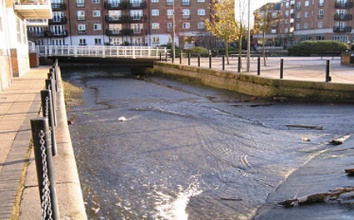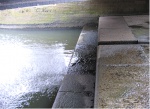Case study:Stoney Sluice, Brentford eel pass: Difference between revisions
Jump to navigation
Jump to search
No edit summary |
Hazel Wilson (talk | contribs) No edit summary |
||
| (10 intermediate revisions by 2 users not shown) | |||
| Line 1: | Line 1: | ||
{{ | {{Case study status | ||
|Approval status= | |Approval status=Approved | ||
}} | }} | ||
{{Location | {{Location | ||
| Line 20: | Line 13: | ||
|Contact organisation=Thames Rivers Trust | |Contact organisation=Thames Rivers Trust | ||
|Multi-site=No | |Multi-site=No | ||
|Project picture=91447301.jpg | |||
|Project summary=Facilitate the passage of elvers around Stoney Sluice, Brentford A Canal and River Trust asset. A desire to improve the River Brent in all aspects, but particularly for fish health and connectivity. | |Project summary=Facilitate the passage of elvers around Stoney Sluice, Brentford A Canal and River Trust asset. A desire to improve the River Brent in all aspects, but particularly for fish health and connectivity. | ||
|Monitoring surveys and results=By May 2013, over 1200 eels had passed through this pass. | |||
Post Project Appraisal | |||
}} | |||
{{Image gallery}} | |||
{{Case study image | |||
|File name=91447302.jpg | |||
}} | |||
{{Case study image | |||
|File name=91447303.jpg | |||
}} | }} | ||
{{Image_gallery_end}} | {{Image_gallery_end}} | ||
{{Toggle_button}} | {{Toggle_button}} | ||
{{Toggle_content_start}} | {{Toggle_content_start}} | ||
{{ | {{Case study subcatchment | ||
|Subcatchment= | |Subcatchment=Brent (below Silk stream down to the Thames) | ||
}} | }} | ||
{{Site | {{Site | ||
|WFD water body code=GB106039023590 | |||
|WFD water body name=Brent (below Silk stream down to the Thames) | |||
|Heavily modified water body=No | |||
|Protected species present=No | |||
|WFD water body code= | |Invasive species present=No | ||
|WFD water body name= | |||
|Heavily modified water body= | |||
|Protected species present= | |||
|Invasive species present= | |||
}} | }} | ||
{{ | {{Project background | ||
|Reach length directly affected= | |Reach length directly affected=5 m | ||
|Project started=2012/01/01 | |||
|Works completed=2012/01/01 | |||
|Total cost category=1 - 10 k€ | |||
|Project started= | |Funding sources=DEFRA through River Improvement Fund | ||
|Works completed= | |||
|Total cost category= | |||
|Funding sources= | |||
}} | }} | ||
{{Motivations | {{Motivations | ||
| | |Specific mitigation=Barriers to fish migration | ||
|Hydromorphological quality elements=Continuity for organisms | |||
|Biological quality elements=Fish | |||
| | |||
| | |||
}} | }} | ||
{{Measures | {{Measures | ||
|Bank and bed modifications measure= | |Bank and bed modifications measure=Sluice improvement | ||
}} | }} | ||
{{Hydromorphological_quality_elements_header}} | {{Hydromorphological_quality_elements_header}} | ||
Latest revision as of 12:24, 27 October 2015
Location: 51° 29' 2.39" N, 0° 18' 36.24" W
Left click to look around in the map, and use the wheel of your mouse to zoom in and out.
Project overview
| Status | Complete |
|---|---|
| Project web site | |
| Themes | Fisheries |
| Country | England |
| Main contact forename | Chris |
| Main contact surname | Cockel |
| Main contact user ID | |
| Contact organisation | Thames Rivers Trust |
| Contact organisation web site | |
| Partner organisations | |
| Parent multi-site project | |
| This is a parent project encompassing the following projects |
No |
Project summary
Edit project overview to modify the project summary.
Facilitate the passage of elvers around Stoney Sluice, Brentford A Canal and River Trust asset. A desire to improve the River Brent in all aspects, but particularly for fish health and connectivity.
Monitoring surveys and results
Edit project overview to modify the Monitoring survey and results.
By May 2013, over 1200 eels had passed through this pass.
Post Project Appraisal
Lessons learnt
This case study hasn’t got any lessons learnt, you can add some by editing the project overview.
Image gallery
|
Catchment and subcatchmentSelect a catchment/subcatchment
Catchment
Subcatchment
Other case studies in this subcatchment: Boston Manor, Brent Lodge Park Improvement, Brent River Park Phase II, Clitherow's Island, Brentford eel pass, Osterley Weir, Hanwell eel pass, Stonebridge Estate, Thames Lock Weir, Brentford eel pass
Site
Project background
Cost for project phases
Reasons for river restoration
Measures
MonitoringHydromorphological quality elements
Biological quality elements
Physico-chemical quality elements
Any other monitoring, e.g. social, economic
Monitoring documents
Additional documents and videos
Additional links and references
Supplementary InformationEdit Supplementary Information
| ||||||||||||||||||||||||||||||||||||||||||||||||||||||||||||||||||||||||||||||||||||||||||||||||||||||||||||||||||||||||||||||||||||||||||||||||||||||||||||||||||||||||||||||||||||||||||||||||||||||||



